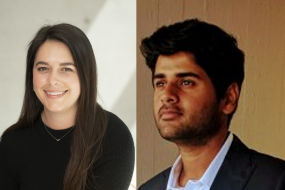Congratulations to Dr Emma Lovell and Dr Priyank Kumar who recently being promoted to Senior Lecturer, we are so proud of you.
Dr Emma Lovell is a researcher in the Particles and Catalysis (PartCat) Research Group. Her research focuses on developing novel catalysts for a range of applications; with a particular focus on energy and environmental catalysis. Emma completed her PhD in 2016 at UNSW developing catalysts for carbon dioxide conversion (with a research exchange at the University of Bremen). She was the recipient of the Women in Engineering Scholarship for the duration of her studies. Her PhD work focused on developing nickel based catalysts for the carbon dioxide (dry) reforming of methane.
Currently, her research focuses on developing catalytic materials for a range of different energy inputs. This includes developing catalysts for the photo/plasmon-enhanced thermal catalytic carbon dioxide methanation and the plasma-catalytic carbon dioxide methanation and nitrogen fixation as well as developing defective electrocatalysis for hydrogen evolution reaction as well as carbon dioxide reduction reactions.
Dr Lovell can be found on linkedin and twitter (@elovelll) and she is an advocate and passionate about Women in Engineering.
Dr Priyank Kumar is a Scientia Fellow in the School of Chemical Engineering. He obtained his PhD in June 2015 under the guidance of Prof. Jeffrey C. Grossman in the department of materials science and engineering at the Massachusetts Institute of Technology, USA. His dissertation focused on the atomistic computational design of two-dimensional materials (graphene, graphene oxide and transition metal dichalcogenides) for electronic, optoelectronic and biomedical applications. He was also closely involved with experiments in the group of Prof. Angela Belcher at MIT. Following his PhD, he won a Marie-Curie grant to carry out his postdoctoral research in the group of Prof. David J. Norris at ETH Zurich, Switzerland. He applied ab initio methods such as density functional theory (DFT) and time-dependent DFT (TDDFT) to investigate plasmonic hot-carrier processes such as plasmon formation, hot-carrier generation, electron transport and electron-phonon coupling at metal-semiconductor and metal-molecule interfaces with an aim to advance photocatalysis and other applications. In May 2019, he started as a Scientia fellow (level B) in the school of chemical engineering at UNSW, Sydney with a vision to establish a computational materials design group and foster experimental collaborations.
He is recruiting PhD student and can be contacted via email or connect via Linkedin

Dr Emma Lovell and Dr Priyank Kumar